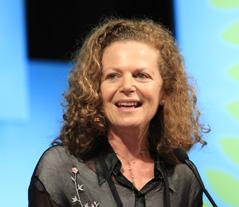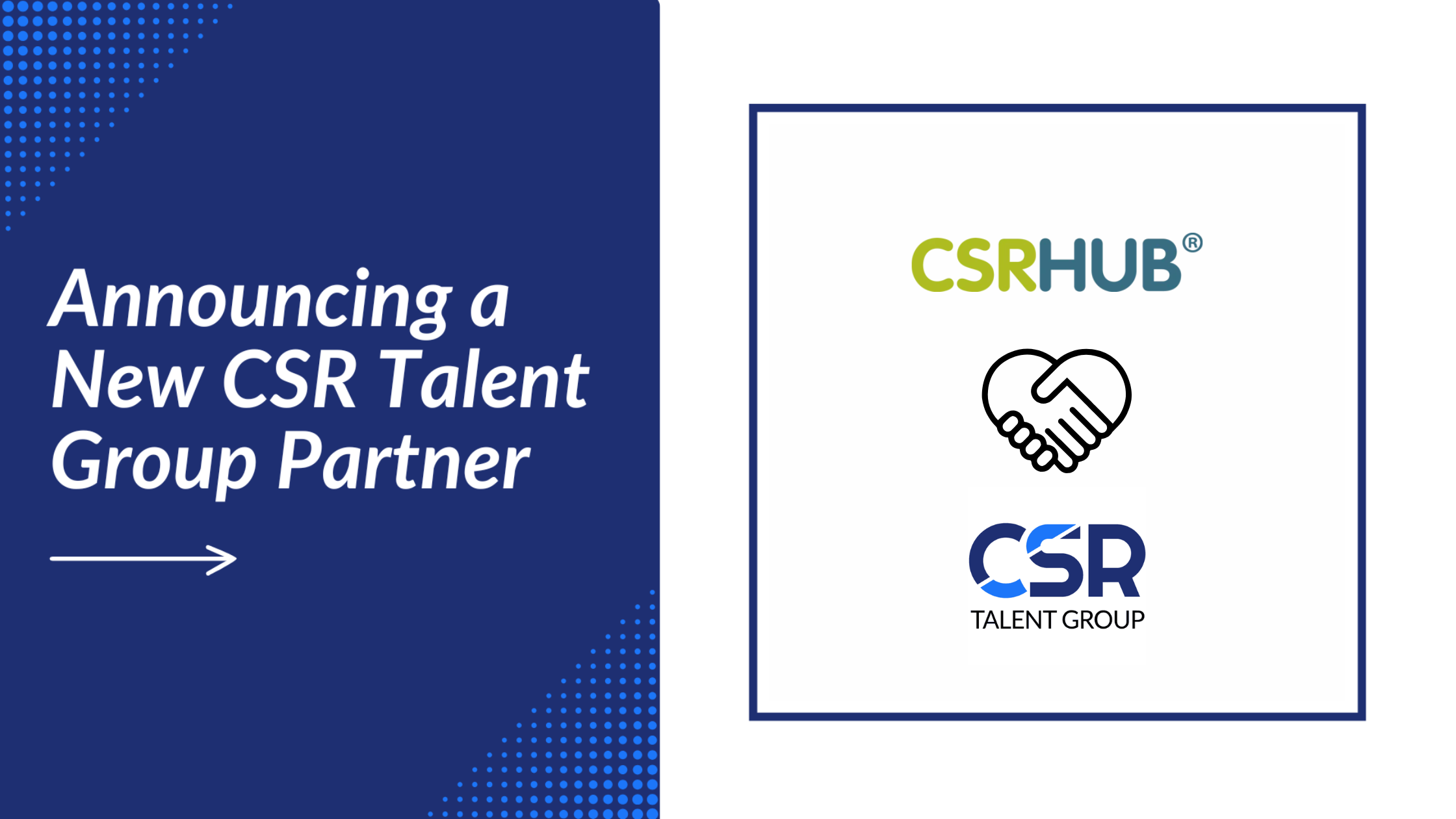Originally published on Forbes.com. More articles by Christopher Skroupa on his Forbes column.
In the past companies have competed to be included in the Dow Jones Sustainability Index or other indices; these lists tend to be fairly short – around 100 companies.
Cynthia Figge is a forerunner and thought leader in the corporate sustainability movement. Figge is CEO and Cofounder of CSRHub, the world's largest database on ESG (environmental, social and governance) performance of 17,500+ companies that provides sustainability ratings and business intelligence to professionals, academics and API partners. In 1996 she co-founded EKOS International, one of the first consultancies integrating sustainability and corporate strategy. Figge has worked with major organizations, including Boeing, BNSF, Coca-Cola and REI, to help craft sustainability strategy integrated with business.
Christopher P. Skroupa: Which industries tend to be most concerned with CSR (corporate social responsibility)?
Cynthia Figge: All industries are – or should be – concerned with CSR. When you look back at the history of involvement with CSR, you will find many industries have come under greater scrutiny or pressure because of exposure. Often times the pressure is focused on big consumer brands that are visible to the public or because of crises that occur where attention is brought to an industry concerning community disruption.
Now we see interest in CSR across all industries. However, I anticipate we’ll see variation determined by a couple of factors, namely the size of companies in a particular industry, and how transparent those companies are in reporting and disclosing data to the public. We are seeing CSR and sustainability practices becoming the mainstream for most companies.
Skroupa: For a company looking to implement better CSR strategies, what do you see as the most important metric for analyzing their current CSR engagement?
Figge: I’d like to start by describing the kind of schema that we have developed over time to capture the thousands of indicators that are being used to measure companies. Today, CSRHub aggregates more than 500 sources of ratings in the CSR realm; these sources include expert analysts that are investor facing, best-of lists and indexes, government databases, crowd sources and nonprofit special interest groups. We now evaluate more than 17,500 companies by aggregating the ratings from many different stakeholders, across four dimensions:
Environmental impact;
Employee treatment;
The impact on the community in which they operate; and
Governance.
The “impact on the community” category has three subcategories. The Product subcategory captures data on product impact. It’s a very broad measure, not specific to any single product within a company’s portfolio. The product subcategory addresses how a company’s products and services impact and improve sustainability.
The second dimension of the community category is focused on human rights and supply chain, which is a really important area to companies. The third is philanthropy or community development: how a company is interacting with a community in which it does business. So companies can use these metrics to analyze their current CSR engagement and performance, across these dimensions.
The Environment category measures performance in three dimensions:
Energy and Climate Change;
Environmental Policy and Reporting; and
Resource Management.
The Employee category measures Compensation and Benefits, Diversity and Labor Rights, Training, Safety and Health. And the Governance category measures Board performance, Leadership Ethics and Transparency and Reporting.
It becomes much more complex because there are many things companies have to do to improve not only their performance, but also the perception of their performance, which deals with both what they're really doing internally on policies, procedures, implementation, operations, strategies, etc., and also how well they’re disclosing information to tell their story.
What we find is that it’s important for companies to do both. They have to walk-the-walk and talk-the-talk. That makes improvement challenging, but we call this the “virtuous cycle” where you use metrics as a feedback mechanism to better understand how you are benchmarked against your peers, and pinpoint the areas in which your company needs to improve. You have to do a better job in telling your story, in addition to actually changing or improving what you're doing.
Skroupa: Which metrics do you see driving the most amount of change for companies tracking their CSR standing? Are companies incentivized by outperforming their competition, by long-term changes in profit or is there another factor?
Figge: Companies have been evolving their strategy around transparency. As they become more transparent, they're probably telling their story better, following reporting standards and doing a better job at disclosure. That being said, there is also a resistance to the proliferation of forms and the many ways companies are asked to report to stakeholders.
There’s a shift in the market where ESG analysts are looking for publicly disclosed information; there’s really a responsibility for the company to make information publicly available, where raters can access the information to fairly evaluate companies. Companies are now seeing this information as a form of business intelligence, and they're using it for competitive analysis and advantage.
In the past companies have competed to be included in the Dow Jones Sustainability Index or other indices; these lists tend to be fairly short – around 100 companies. At CSRHub, we rate more than 17,500 companies worldwide and cover a much bigger universe of companies that are reporting. I believe that companies are now recognizing they can use this data to benchmark, compete and identify the areas where their competitors and peers are not doing an adequate job of disclosing their respective performance or are moving ahead.
An example of a recently published list where ESG performance impacted the outcome is the “Harvard Business Review’s” (HBR) top 100 CEOs. Up until about two years ago, the HBR top CEO list did not include an ESG dimension in the determination of the top CEOs. Then they started using two ESG ratings sources, including CSRHub, to help determine who the top CEO’s are. Now, 80 percent of the factors are financially related, and 20 percent are ESG related. That’s had a very large bearing on the ranking of companies and their CEOs. CSR has become a more important part of mainstream determination of excellence and competitiveness.
Another example is the recent release of the Drucker Institute Management Top 250, listing the top 250 companies based on a holistic measure of corporate effectiveness, including dimensions such as innovation, CSR, financial strength, employee engagement and customer satisfaction. Again, the dimension of not only CSR, but also the influence of some of the CSR-related metrics in employee measurement, and also in innovation, really had a large impact on this list as well.
I think for these kinds of reasons, companies are realizing that CSR is not a standalone metric; it’s a metric related to other measures such as brand strength, digital communication strength, reputation and access to credit. As companies become more sophisticated they recognize that this is a very key metric in measuring a part of competitiveness and value.
Skroupa: What do you foresee affecting CSR implementation in 2018?
Figge: The shift of CSR as a key part of business intelligence will continue to drive its implementation. Several studies indicate that CEOs think CSR is an important part of strategy. What's lagging isn’t the understanding that CSR is an important part of strategy, but rather how well companies are doing in actually implementing it. I think as companies do a better job of using these metrics for competitive insight, for looking at how well they’re doing, where they need to improve, what stakeholders they need to engage to better understand their brand and sustainability perception, we'll see an increase in reporting and performance.
We are seeing increasing pressure to report on CSR from organizations like the World Federation of Exchanges, Nasdaq and others who are asking their companies to report. We see increased interest in private equity firms requiring their portfolio companies to report. Bloomberg provides an ESG Disclosure score on about 8,000 companies, and that’s exposing company transparency.
We also see a trend of ESG integration in investing decisions – so ESG performance metrics are mainstreaming in financial markets.
Companies’ stakeholders – including customers and employees – are asking them to increase their reporting and transparency; that’s the adage of what is measured can be better managed in CSR implementation. We’ll continue to see those trends, as well as continued pressure on supply chains.
There’s a lot of information we don't know publicly about suppliers, but there will be a continued focus in this new year on supplier measurement, requirements and disclosure in CSR. The good news around supplier transparency is that it helps many of us who are trying to understand the smaller, privately held companies’ performance as well. That data has remained fairly difficult to get our hands on – we call it “dark data.”
As we move forward in the new year we are going to see the emergence of some of these standards and more requirements for disclosure, the use of the data for business intelligence and ultimately improved performance and competitiveness.
Skroupa: For companies looking to become CSR-centric, what is the biggest challenge impacting their transition?
Figge: I wrote an article a number of years ago about the “Sustainability Natives.” Millennials have grown up believing CSR is an integral part of what it means to be a business. It isn’t something companies do because they are pressured, regulated or got a bad reputation through some crisis. It's not a bolt-on program. That is truly a big transition we are going to go through.
Some businesses are already making the shift. Companies like Unilever or Patagonia are making the shift with help from their CEO or top leadership team. I think the shift is probably much bigger and more profound than we yet understand. As the pressure ripples through, millennials are asking, “where do I want to work, where do I want to shop, where do I want to invest my money, aligned with my values.” This is why a CSR-centric mentality is becoming inherent for 21st century companies.
CSR is going to be so much a part of these core decisions for people who are moving out of school and into their 20s and 30s, and eventually assuming positions of leadership. That gives me hope that CSR will just get stronger. To companies looking to avoid the change: you can run, and you can hide, but you can’t do this for long.
Skroupa: For the companies that are already well-established, that were not built with the CSR foundation in mind, what is their biggest challenge?
Figge: One of the big challenges is the pace of change needed across a complex-enterprise. Many companies are making progress in one area, but other places in the company are lagging. Or they set some goals that they're going to improve 20 percent of their product portfolio, but what about the remaining 80 percent? The biggest challenge may be incrementalism. Companies move forward and do this work in part, because it’s really hard to do this kind of change whole-scale.
Some companies are looking at absolute targets related to what it will take to get us to certain planetary goals, i.e., a limit in the rise in global temperature or combatting very serious problems. However, most companies are incrementally improving relative to their own growth. Maybe we're doing better in the relative sense, but in an absolute sense, in terms of what do we need as a planet, we're not making the progress that we need. It’s very challenging to develop the metrics to assess from an external point of view how we are performing from a more absolute, future forming perspective.
In the late 1990’s, I wrote an article on the disruptive power of sustainability. The power of sustainability is fundamentally to help companies reimagine their business models and to innovate and disrupt.
Now, 20 years later, we’re finally getting to that place. A few companies have been on the learning curve since the beginning of the journey, but now it’s a fundamental challenge for all companies. To bring business forward, we have to do incremental improvements. However, the challenge is driving fundamental disruption; companies using CSR as a design constraint for fundamental reimagining is where the really hard work lies.
Christopher P. Skroupa is the founder and CEO of Skytop Strategies, a global organizer of conferences.
 Cynthia Figge is a forerunner and thought leader in the corporate sustainability movement who co-founded EKOS International in 1996, one of the first consultancies integrating sustainability and corporate strategy. Cynthia is CEO and Cofounder of CSRHub. Cynthia has worked with major organizations including BNSF, Boeing, Coca-Cola, Dow Jones, and REI to help craft sustainability strategy integrated with business. She was an Officer of LIN Broadcasting/McCaw Cellular leading new services development, and started a new “Greenfield” mill with Weyerhaeuser. She serves as Advisor to media and technology companies, and is Chair of the Board of Compassionate Action Network. Cynthia has an MBA from Harvard Business School. Cynthia is based in the Seattle area.
Cynthia Figge is a forerunner and thought leader in the corporate sustainability movement who co-founded EKOS International in 1996, one of the first consultancies integrating sustainability and corporate strategy. Cynthia is CEO and Cofounder of CSRHub. Cynthia has worked with major organizations including BNSF, Boeing, Coca-Cola, Dow Jones, and REI to help craft sustainability strategy integrated with business. She was an Officer of LIN Broadcasting/McCaw Cellular leading new services development, and started a new “Greenfield” mill with Weyerhaeuser. She serves as Advisor to media and technology companies, and is Chair of the Board of Compassionate Action Network. Cynthia has an MBA from Harvard Business School. Cynthia is based in the Seattle area.
 Christopher P. Skroupa is the Founder and CEO of Skytop Strategies: I focus on the intersection of government, Wall Street & main street. I work with institutional investors and fund managers in the U.S., Europe and Asia on issues involving asset allocation, risk management, corporate governance, active investing and socially responsible investments. I focus on the intersection of government, Wall Street and main street. It's an active crossroad these days as companies and investors address how to bring stakeholders into the discussion of value creation, beyond share price, and through sustainability. I encourage a constructive, solutions-based approach to many hot buttons on the current market agenda.
Christopher P. Skroupa is the Founder and CEO of Skytop Strategies: I focus on the intersection of government, Wall Street & main street. I work with institutional investors and fund managers in the U.S., Europe and Asia on issues involving asset allocation, risk management, corporate governance, active investing and socially responsible investments. I focus on the intersection of government, Wall Street and main street. It's an active crossroad these days as companies and investors address how to bring stakeholders into the discussion of value creation, beyond share price, and through sustainability. I encourage a constructive, solutions-based approach to many hot buttons on the current market agenda.
CSRHub provides access to the world’s largest corporate social responsibility and sustainability ratings and information. It covers over 17,700 companies from 135 industries in 133 countries. By aggregating and normalizing the information from 556 data sources, CSRHub has created a broad, consistent rating system and a searchable database that links millions of rating elements back to their source. Managers, researchers, API partners and activists use CSRHub to benchmark company performance, learn how stakeholders evaluate company CSR practices, and seek ways to improve corporate sustainability performance.



